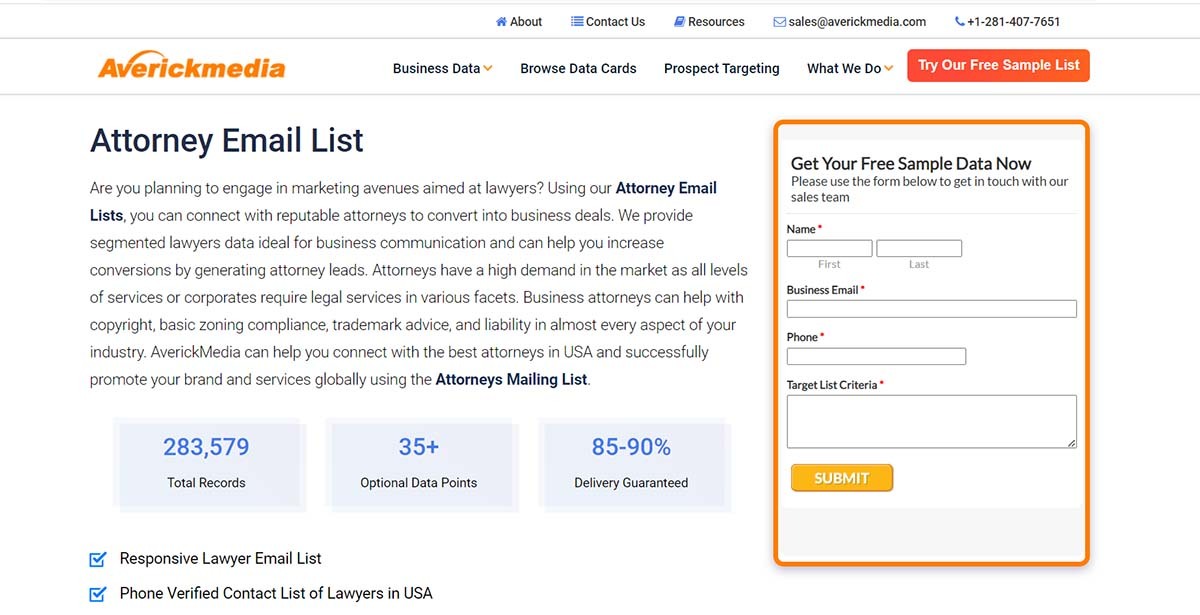Score More Clients: Best 10 Tried-and-True Lead Generation Tips for Lawyers
You're a lawyer and you need a personalized approach to generating your leads. In the competitive legal landscape, a one-size-fits-all approach simply won't cut it. Your profession demands individualized marketing approach that are different than others.
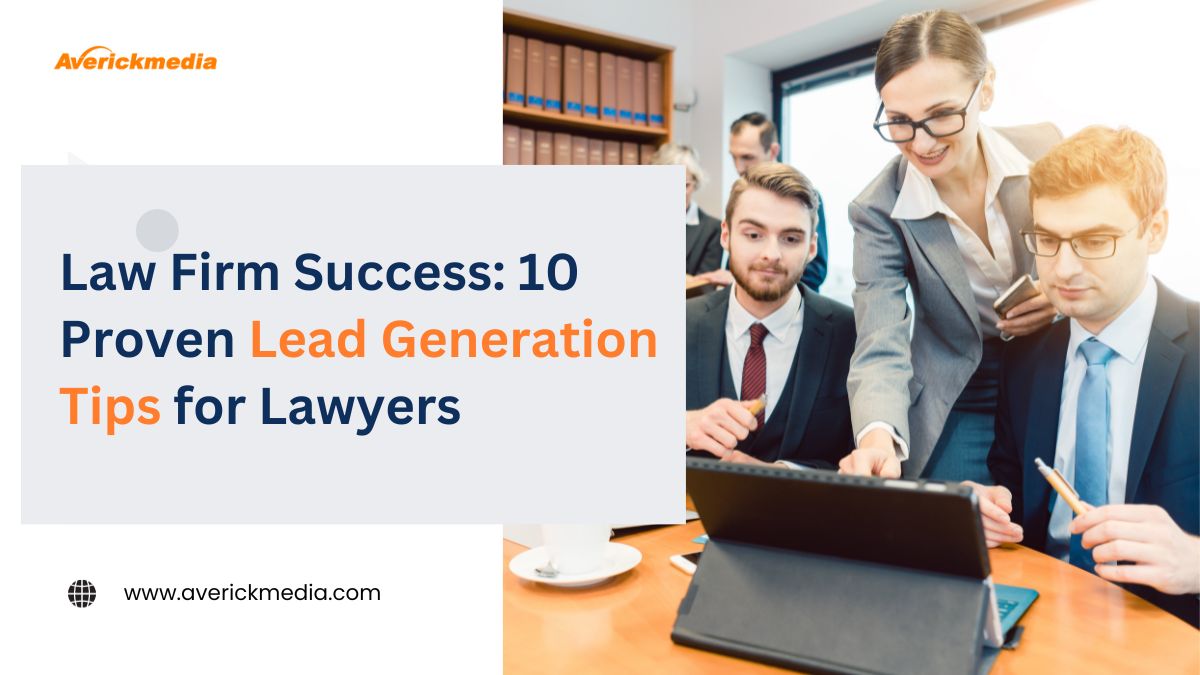
Today, we delve into the art of crafting personalized lead generation strategies that not only guarantee solid results but also accelerate your path to success. Let's explore how lawyers can harness bespoke methods to connect with potential clients effectively.
Why Is Lead Generation Strategies Imperative In The Legal Profession?
The competition among law firms is intensifying, and in addition to the essential tasks of legal content creation and SEO for lawyers, there's a growing emphasis on acquiring high-quality leads.
Lead generation for attorneys is centered around creating a robust pipeline of prospective clients who express genuine interest in legal services. It's worth noting that not all leads will align with a lawyer's practice or preferences, making the focus on cultivating a selection of high-quality leads a preferred strategy in the legal industry.
But What Are Leads And Lead Generation Techniques?
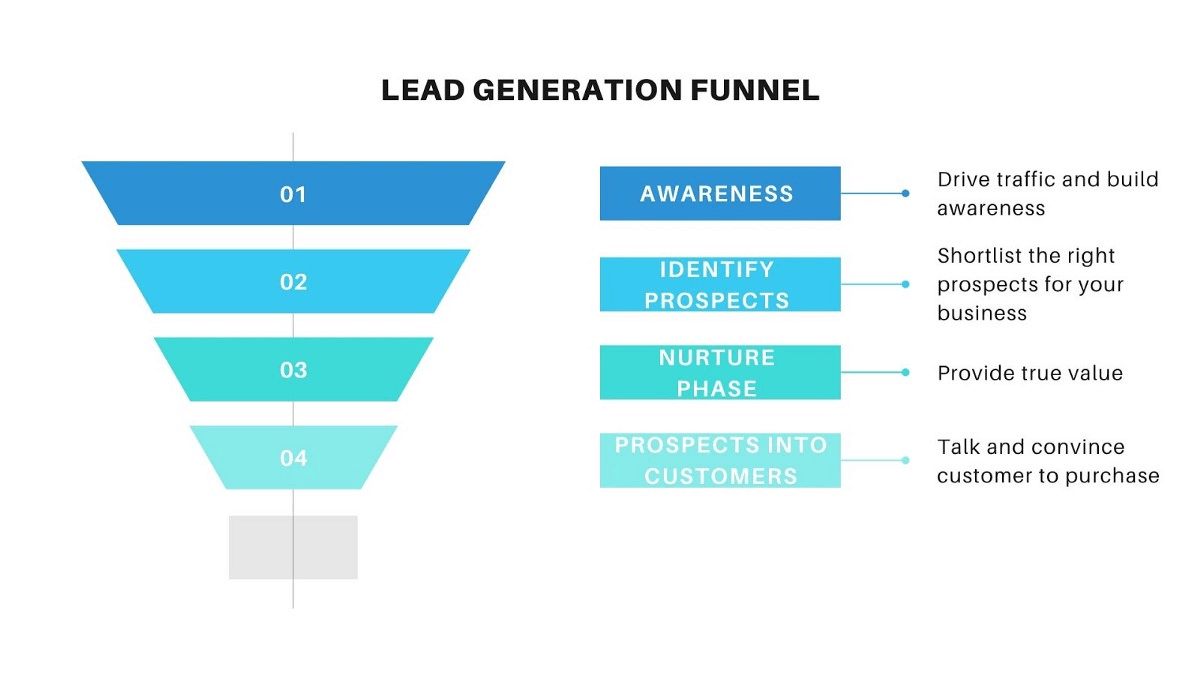
Source: clickmatix
Leads in the legal profession are potential clients who reach out or express interest in your legal services. They can find your law practice through different channels, such as organic searches on Google, clicking on paid ads on other websites, encountering your website through social media channels, or providing their contact information on other legal websites, which then forwards their information to you.
The process of finding the leads is called lead generation techniques. This includes finding or identifying sales leads and nurturing them through the sales funnel until they convert to paying clients.
Why Is It Important?
Lead generation is a critical process in the business world, involving the identification and nurturing of potential sales prospects until they ultimately become paying clients. For law practices, developing a robust lead generation strategy is essential for business growth. In fact, it's such a pivotal aspect of marketing that 36% of marketers have identified it as their top priority. Consistent lead generation is imperative for maintaining a steady and reliable flow of clients, ensuring that when one case concludes, your practice doesn't face a shortage of clients.
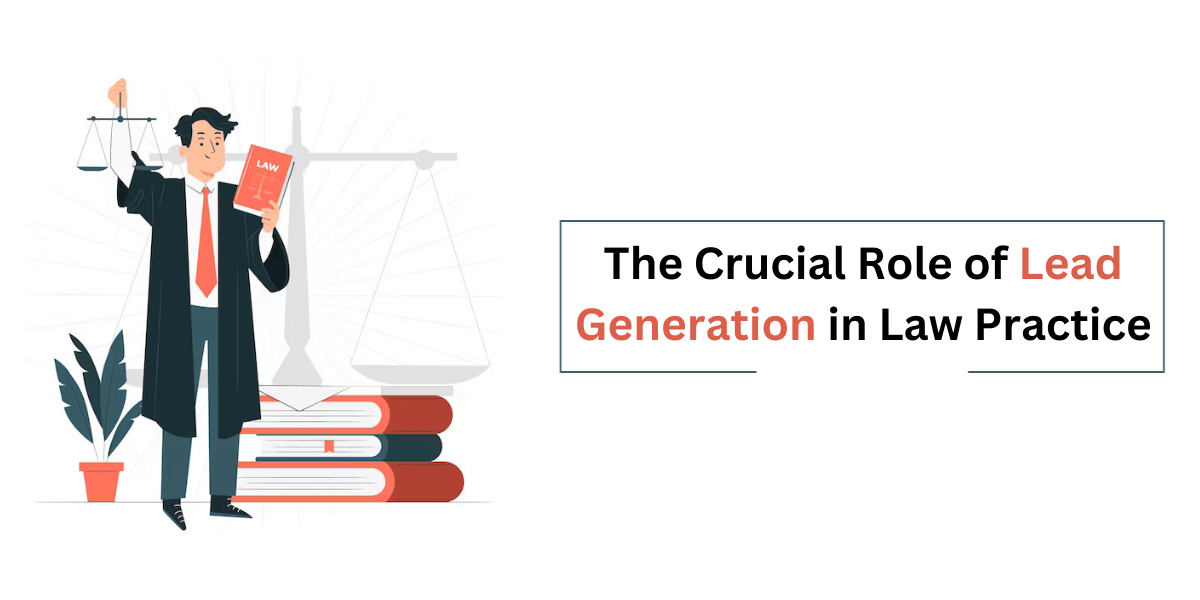
Contrary to the misconception that effective lead generation requires large sales and marketing teams, the truth is that anyone, including small business owners like law practitioners, can successfully manage lead generation with the right approach and some guidance.
In addition, lead generation services for law firms offer several advantages, including:
Potential Clients Contact You (Not the Other Way Around): By implementing powerful inbound digital marketing strategies like content marketing and PPC ads for lawyers, potential leads proactively seek your services. This eliminates the need for sending bulk mailers or making unsolicited calls, as interested individuals come to you with a genuine interest in learning more about your law firm and its offerings.
Grow Your Law Firm Brand Awareness: When leads originate from your website, they have the opportunity to familiarize themselves with your law firm even before reaching out. They can peruse your practice area content, review your case results, read client testimonials, and watch informative videos on your website. As a result, when they engage in discussions about their legal matters with you, they already feel a sense of familiarity and trust.
Gather Information Before Initial Contact: The lead generation process enables you to collect valuable information about potential clients before the initial consultation. Whether through a case evaluation form on your website or questions posed by your receptionist during a phone call, this information allows you to personalize your response and determine the most suitable lawyer within your practice to meet with them. This tailored approach enhances the overall client experience and increases the likelihood of successful client acquisition.
Top 10 Best Tried-and-True Lead Generation Tips for Lawyers
As a lawyer running your own practice or working within a small firm, it's evident that your primary focus remains on serving your current clients. Balancing client responsibilities with effective lead generation is crucial. The following strategies will enable you to generate and nurture leads efficiently, allowing you to dedicate ample attention to your existing clients:
1. Create an Online Identity
In today's digital age, establishing a professional and distinctive online presence is paramount for lawyers. The centerpiece of this endeavor is creating a website that not only showcases your legal expertise but also sets your practice apart from the rest. While your primary commitment is to your existing clients, a well-crafted website can act as a silent partner, working tirelessly to attract and engage potential leads.

In addition, Your website is undoubtedly your most dependable and trustworthy marketing asset, regardless of your profession. It plays a pivotal role in creating a lasting impression on potential clients who are considering your legal services. In today's digital age, where information is sought online, having a well-designed website is critical. Legal clients, in particular, tend to gather extensive information from a law firm's website before making the decision to entrust their cases.
To amaze and engage your website visitors effectively, here are key considerations:
- Recognize that the majority of your website traffic, including potential clients, comes from mobile devices. Therefore, your website must be fully mobile-responsive, ensuring a seamless and user-friendly experience on smartphones and tablets.
- Optimize your site's performance to ensure quick loading, enhancing user satisfaction.
- Employ effective SEO tactics to improve your website's search engine rankings.
- The visual aesthetics of your website matter significantly. Create a UI that speaks of your work.
- Ensure that your website is easy to navigate. Visitors should quickly find the information they seek, whether it's about your practice areas, team, or contact details.
- Incorporate convenient features like live chat and callback services.
Industry-Specific Email Lists
2. Craft a Distinctive Social Media Strategy for Your Legal Practice
Establishing an active social media presence is essential for any business looking to connect with its target audience effectively. However, the legal profession and related fields often face challenges in utilizing social media as a promotional tool. Many individuals hesitate to seek advice due to preconceived stereotypes about lawyers and legal professionals.
Yet, by actively participating in social media and challenging these stereotypes, you can reshape the public perception of lawyers and related professionals.
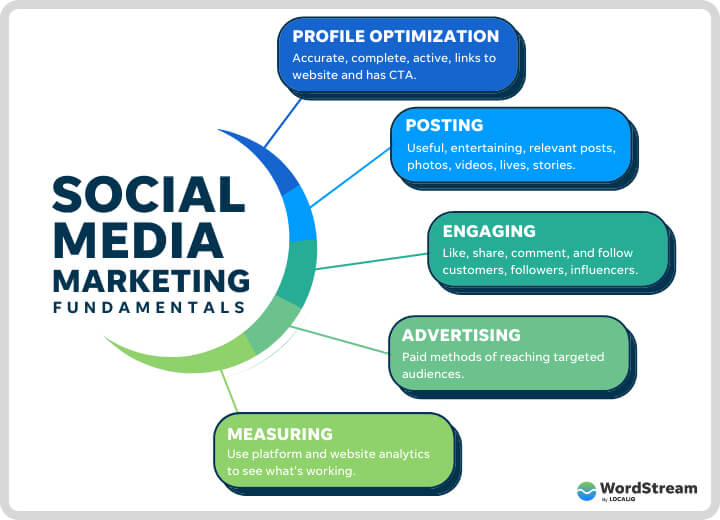
Here are some unique strategies to consider:
- Educational Webinars and Live Q&A Sessions: Host webinars or live Q&A sessions on legal topics relevant to your practice area. Provide valuable insights and answer questions from your audience. Promote these events through your social channels to attract potential clients seeking expert advice.
- Highlight Legal Victories: Share case successes (with client consent and maintaining confidentiality) on social media. Explain how you achieved favorable outcomes, demonstrating your competence and skills. This can attract individuals facing similar legal issues.
- Highlight Legal Victories: Share case successes (with client consent and maintaining confidentiality) on social media. Explain how you achieved favorable outcomes, demonstrating your competence and skills. This can attract individuals facing similar legal issues.
- Legal Explainer Videos: Produce short, engaging videos that simplify complex legal concepts or provide tips on handling common legal issues. Video content tends to perform well on social media and can establish you as a knowledgeable resource.
- Legal Blog Posts: Share links to in-depth blog posts on your website that explore legal topics in detail. These posts can serve as valuable resources and also drive traffic to your website, where visitors may convert into leads.
- Engage in Industry Conversations: Participate in discussions and forums related to your practice area on social media platforms. Offer expert insights and engage with potential clients seeking advice or recommendations.
- Paid Social Advertising: Consider investing in paid social media advertising. Platforms like Facebook, LinkedIn, and Instagram offer targeting options to reach specific demographics, making it easier to connect with potential clients.
- Collaborate with Influencers: Identify social media influencers or industry experts in related fields and collaborate with them. Joint webinars, interviews, or content partnerships can expand your reach to a broader audience.
3. Use Paid Advertising Strategically
While PPC (Pay-Per-Click) advertising is undeniably a powerful tool for generating leads, its influence extends far beyond that singular purpose. It stands as one of the most effective strategies to broaden your presence and make your legal practice known to a broader audience.
But how to get started?
While it's entirely feasible to independently set up and oversee your PPC campaign (thanks to user-friendly platforms like Google), opting for the services of a reputable PPC agency tailored to the legal field can prove to be a shrewd marketing decision. Over the course of a 12-month campaign, investing in monthly agency support can ultimately yield cost savings.
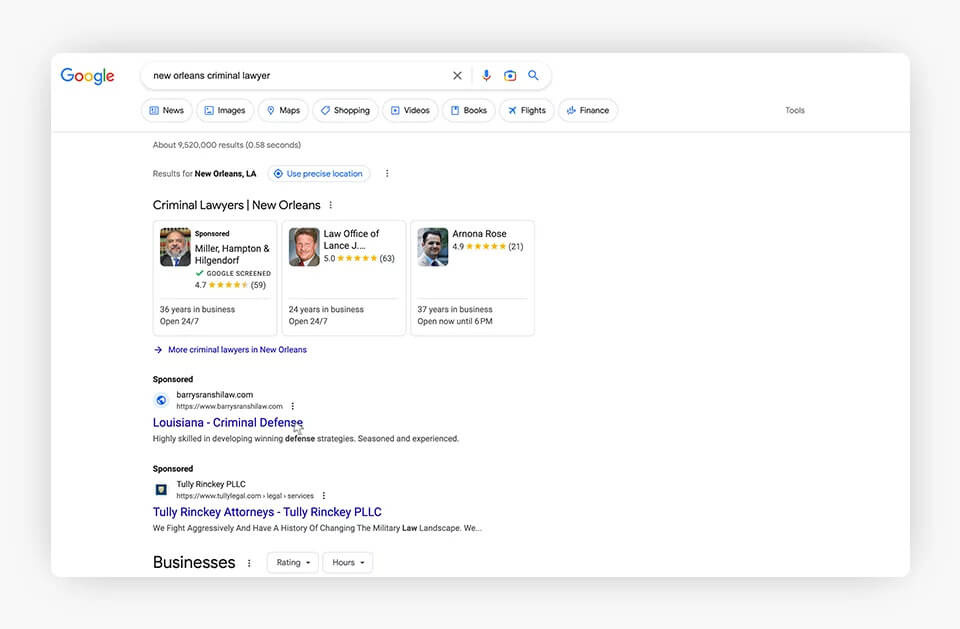
Source: Justia
Enlisting the expertise of a team of legal marketing professionals, well-versed in the art of targeted ad placement and crafting compelling ad copy, is pivotal to achieving meaningful conversions. For instance, while enigmatic or curiosity-inducing ad text may generate clicks, attracting clicks solely for curiosity's sake can drain a law firm's advertising budget without delivering valuable leads.
4. Google Local Service Ads
Local Service Ads operate on a pay-per-lead framework, distinguishing them from the traditional pay-per-click model. For lawyers who choose to advertise through Local Service Ads, a significant advantage is the "Google Screened" badge, affirming Google's meticulous background and license verification process, ensuring that they maintain a positive professional standing.

Source: Netvantage Marketing
Setting up Local Service Ads is a straightforward process:
- Google Verification: Begin by verifying your legal practice through the Google My Business platform, ensuring accurate business details and essential documentation.Google Verification: Begin by verifying your legal practice through the Google My Business platform, ensuring accurate business details and essential documentation.
- Background Check: Google will initiate a comprehensive background check to confirm your good standing as a lawyer or legal professional.
- Budget Allocation: Determine your advertising budget based on the number of leads you aim to generate. This budget is used to pay for actual leads, not just clicks.
- Ad Activation: Activate your Local Service Ads when you're ready to begin. These ads can be paused or activated at your convenience, allowing flexibility in your advertising strategy.
Recent Marketing Articles
- An Inside Look at Meta Threads: Statistics and Insights for 2023
- Comprehensive Guide to Types of Sales Channels and Selling Your Product Successfully
- The Importance of a Targeted Biotechnology Industry Email List
- Generate Business Sales Leads With These Tips
- Best Ways to Generate More Business Leads
- How To Use Data In Marketing?
- Best Healthcare Email Lists Providers
- How ChatGPT Will Affect The Future Of SEO?
- How to Spend Your 2023 Marketing Budget: 5 Ways to Succeed This Year
- 10 Must-Know Tips for Marketing Your Law Firm In 2023
- How Buying B2B Data Helps To Close More Deals?
- 10 Tools That Actually Close More Deals
5. Cultivate Client Connections with Email Marketing
Lead nurturing is a crucial component of the legal profession, but it's often overlooked. Building meaningful relationships with potential clients takes time and effort, and that's where tailored email marketing comes into play. It's not just about sending generic emails; it's about crafting a personalized journey that guides leads towards becoming loyal clients.

Source: Hubspot
Here's how you can nurture leads effectively and stand out in the competitive legal landscape using email marketing:
- The Personal Touch: When it comes to legal matters, people want to know they're not just another case number. Start your lead nurturing journey by addressing potential clients by their names. A personalized greeting can make a significant difference in making them feel valued and heard.
- Educational Content: Legal issues can be complex and overwhelming. Use email marketing as an opportunity to educate your leads. Share informative articles, legal guides, or case studies relevant to their concerns. This not only showcases your knowledge but also helps leads understand their situation better.
- Building Trust: Trust is the cornerstone of any client-attorney relationship. Share client testimonials, success stories, and examples of how you've helped others in similar situations. These real-life experiences can go a long way in building trust and credibility.
- Timely Communication: Stay engaged with your leads at the right moments. Send follow-up emails after initial inquiries, provide updates on legal developments that affect them, or remind them of important deadlines related to their case.
- Call to Action: Each email should have a clear call to action (CTA). Whether it's scheduling a consultation, downloading a legal resource, or requesting more information, make it easy for leads to take the next step.
- Mobile Optimization: Today, 85% of users use smartphones to access email. Emails are often opened on mobile devices. Ensure your email templates are mobile-responsive, providing a seamless experience for leads regardless of the device they use.
- Analytics and Feedback: Track the performance of your email campaigns. Use analytics to understand what content resonates with your audience and what needs improvement. Solicit feedback from leads to continually refine your email marketing strategy.
6. Get a Attorney Email List
While blog subscriptions, email newsletter signups, and gated content can be effective ways to collect attorney email addresses, they often demand ongoing attention and monitoring. However, building and utilizing an email list can streamline this process, offering similar results more rapidly and efficiently.
An email list provides a direct channel for communication, allowing you to promptly share information, updates, and promotions with lawyers and potential clients. It offers a quicker means of outreach, enabling you to reach a broader pool of prospects in a shorter span of time. Moreover, emails can be personalized to create a more engaging and tailored experience for recipients. This personalized approach can help establish stronger connections and generate leads more effectively compared to other methods that necessitate continuous oversight.
7. Manage Your Reviews Online
If you've already established an online presence, have you been actively managing and monitoring reviews? If not, now is the opportune moment to start. Online reviews play a pivotal role in shaping your reputation and influencing potential clients' decisions. Actively managing and responding to reviews can build trust, demonstrate your commitment to client satisfaction, and enhance your online image. Not to mention, a whopping 93% of consumers acknowledge that online reviews play a pivotal role in influencing their decisions.

So how do you manage it?
- Regular Monitoring: Routinely check popular review sites relevant to your legal niche, such as Google, Yelp, Avvo, or industry-specific platforms, to stay informed about incoming reviews.
- Swift Response: Aim to respond to reviews, both positive and negative, in a timely manner, ideally within 24-48 hours. Acknowledge the reviewer's feedback and express your gratitude or willingness to address any concerns.
- Professionalism: Maintain a professional and courteous tone in all responses. Never engage in confrontations online, as this can tarnish your reputation.
- Negative Review Resolution: For negative reviews, approach them constructively. Apologize for any issues encountered, offer solutions or explanations if appropriate, and demonstrate your commitment to improving client experiences.
- Encourage Positive Reviews: Actively encourage satisfied clients to leave positive reviews. Provide convenient links to review profiles in email signatures, on your website, and in post-service communications.
- Accuracy: Monitor reviews for accuracy. If you encounter false or misleading reviews, consider reporting them to the platform for removal.
- Learn and Adapt: Analyze reviews to identify recurring themes or areas for improvement. Use constructive feedback to refine your services and show your commitment to continuous growth.
8. Share testimonials
Testimonials are a surefire strategy in the legal profession. It is consistently proving to be one of the most effective methods for attracting clients who are genuinely eager to collaborate with your practice.

Source: The Modern Firm
Some potential benefits include –
- Trust and Credibility: Testimonials act as a seal of trust and credibility, assuring potential clients of your legal competence and the quality of your services.
- Social Validation: They provide valuable social validation. When potential clients witness positive feedback from others who have benefited from your legal expertise, it bolsters their confidence in your abilities.
- Emotional Connection: Testimonials often convey personal stories and positive experiences. These narratives establish an emotional bond with potential clients, making them more inclined to reach out for assistance with their legal concerns.
- Decision Confidence: Knowing that others have had successful interactions with your practice alleviates hesitation in potential clients, prompting them to take action and engage with your services.
Industry-Specific Email Lists
9. Maximize Engagement with Diverse Communication Channels
Recognize that each client possesses unique communication preferences. Therefore, offering various methods for your clients and leads to connect with you can significantly enhance your practice's accessibility. Consider a range of communication channels, including printed letters, memos, or mailings; email; video or audio conferencing; social media platforms; and live chat and text messaging.

Source: Statista
Having diverse communication channels can empower clients to engage with your practice in the manner most comfortable for them, ultimately enhancing client satisfaction and strengthening relationships.
10. Balance the Quality and Quantity of Legal Leads
While it's common practice to pursue a high volume of leads with the belief that more leads mean more potential clients, it's crucial to strike a balance between quantity and quality.

Here's how to discern the quality of prospective clients:
- Marketing-Qualified Leads: These leads may not yet have the intent to engage your services, but they've shown interest by engaging with your content or joining your email list.
- Product-Qualified Leads: These leads have interacted with a no- or low-risk version of your service. For instance, someone who participated in a free consultation call with a personal injury firm falls into this category. They've experienced your service and could potentially become paying clients.
- Sales-Qualified Leads: These leads are ready to commit and pay for your services. When someone, after engaging with your content, expresses interest in pricing or requests to speak with your sales team, they fall into this category.
Focusing on obtaining a substantial quantity of these types of leads ensures that your efforts in lawyer lead generation are both efficient and worthwhile.
Prioritize Both Online and Offline Presence
Balancing your online and offline presence is crucial for legal professionals in today's digital age. While the internet has transformed how clients search for legal services, traditional offline networking, and community involvement remain influential. An effective online presence, through a professionally designed website and active social media profiles, allows potential clients to research your credentials, read testimonials, and gain trust in your expertise even before meeting in person. This 24/7 accessibility means that clients can engage with your services at their convenience.
On the other hand, offline engagement, such as local networking events, seminars, and volunteer activities, can build strong local connections, leading to valuable word-of-mouth referrals. Striking the right balance ensures that you reach a broader audience, cater to diverse client preferences, and create a well-rounded and successful legal career.
Facing Challenges in Connecting with Legal Professionals?
Connecting with legal professionals can indeed pose a significant challenge. However, InfoGlobalData is here to alleviate your concerns and make this process seamless for you. We take pride in offering a comprehensive solution by providing you with a meticulously curated and 100% opt-in leads list of legal professionals.
What sets us apart is our commitment to verification. Our data undergoes rigorous scrutiny to ensure accuracy and reliability. This means that when you partner with InfoGlobalData, you can trust that you're accessing a high-quality database of legal contacts who are genuinely interested in your offerings. With us as your partner, you can effectively leverage the strategies mentioned in this blog. Hence generating lots of leads.
